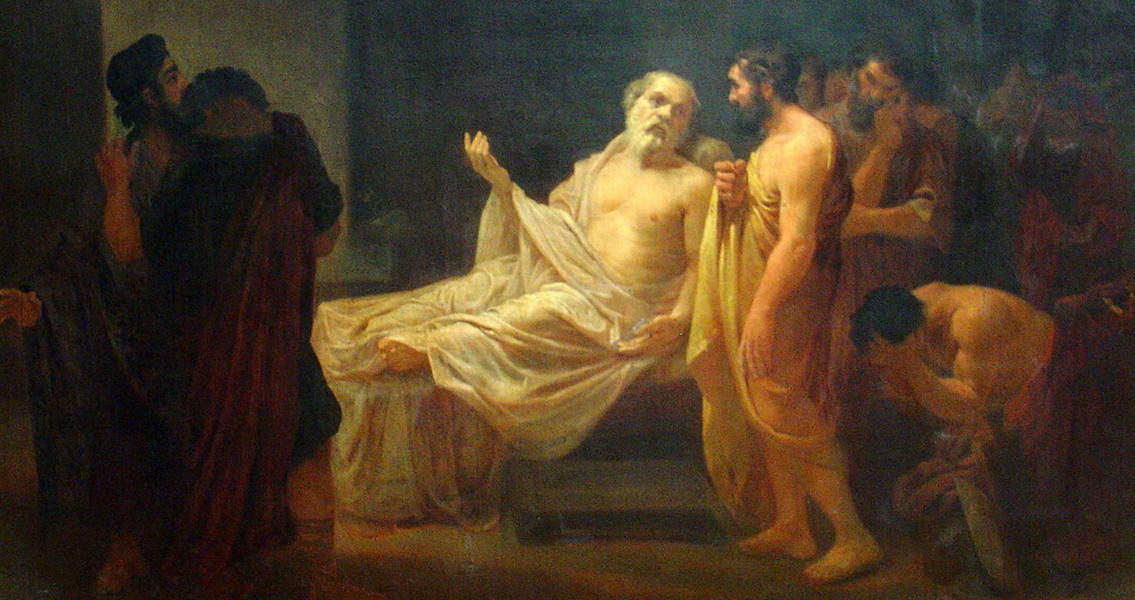<![CDATA[On this day in 399 BCE, the hugely influential Ancient Greek philosopher Socrates was sentenced to death. The verdict marked the end of a trial in which Socrates had been accused of charges such as 'impiety' and 'corrupting the young'. The sentence was death by drinking poisonous Hemlock, meaning Socrates would be forced to act as his own executioner. Considering that ancient Athens is generally portrayed as a radical democracy, the decision to sentence one of its most renowned philosophers seems contradictory. Nevertheless, Socrates had become highly controversial for a number of reasons at a time of great upheaval as Athens recovered from the aftermath of the brutal Peloponnesian War with Sparta. Details of Socrates life are scarce, the main sources being writings of his students such as Plato. He was a firm believer in the potential of philosophy to achieve practical results socially and politically, and in particular in an ethical system based on human reason rather than theology. These ideas translated to his views on politics. Socrates believed that neither democracy or tyranny were effective means of rule. Instead, he advocated a system of government ruled by individuals of the greatest ability and virtue. His biggest contribution to modern philosophy however, was the methods he deployed in his analyses. The Socratic method was built around dialetical questioning to test and improve a hypothesis. It didn't rely on the philosopher delivering a complete hypothesis to his students, but rather a constant reevaluation of an idea in the public arena. At its basis was an argument that awareness of one's own ignorance was the key characteristic for any philosopher, a quote often attached to Socrates being: "I know that I know nothing." It was a method which made Socrates a prominent figure in Athens, the philosopher roaming the city to engage in dialogues with anyone from prominent Athenian politicians to regular 'people in the street'. His critical approach won him many supporters, but it also made him enemies, with some politicians viewing his deconstruction of their policies as either patronising or an attempt to humiliate them. Some argue that it was this that led to a conspiracy which ended with Socrates on trial. In a broader sense, Socrates was associated with the two oligarchical coups in Athens in the aftermath of the Peloponnesian War, in 411 and 404 BCE. The principal leaders in the brutal coups, flamboyant aristocrats Alcibiades and Critias, had both held close relationships with Socrates, Alcibiades as a lover, Critias as a student. Both coup leaders were eventually executed following the restoration of democracy, and a theory widely circulated around Athens at the time was that Socrates' association with these prominent anti-democrats swayed the jury against him. Finally, Socrates was associated with the Cynics, a movement of youthful rebels who publicly claimed Socrates as their teacher. The Cynics became increasingly outrageous, mocking the law, refusing to consider themselves as citizens, and engaging in acts of indecency such as masturbating publicly and defecating in the streets. Socrates was narrowly found guilty at the trial, with some 280 of 500 jurors deciding he had to be punished. Defiant to the last, Socrates' rebellious streak may have contributed to the severity of the punishment. When asked by the jury what he thought his sentence should be, Socrates argued he should be rewarded with free meals for the rest of his life. When pressed further he suggested a modest fine. Greek justice stated that the jury choose either the death sentence or one selected by the defendant, such were Socrates' actions the jurors were left with no choice but to have him executed. ]]>
Socrates Sentenced to be his Own Executioner
